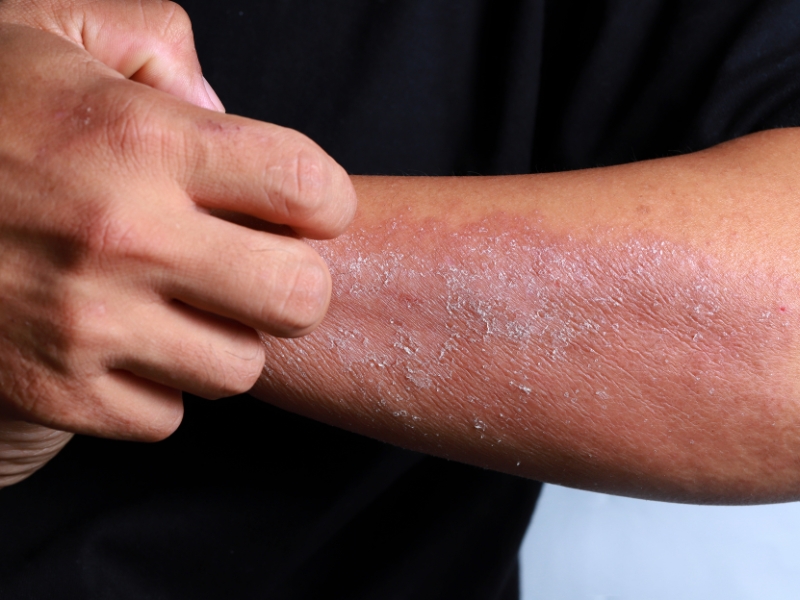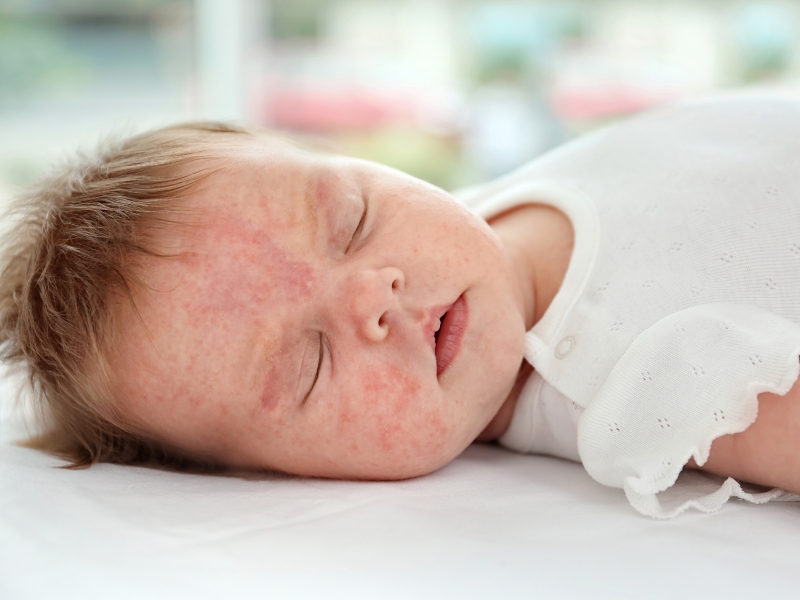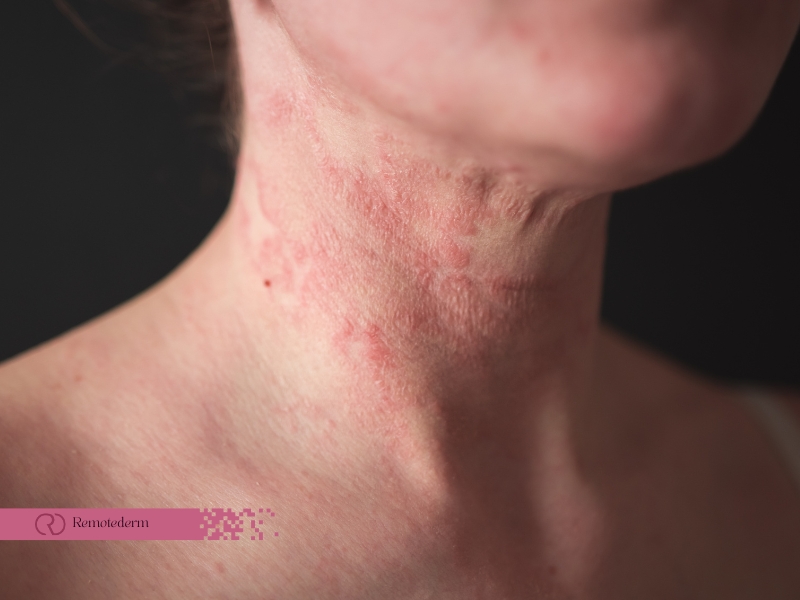Eczema is a really painful and complicated skin problem for many people in Canada. This article investigates the causes of eczema, the way it causes suffering to those who are affected, and suggests the measures to get relief. For those with eczema or those caring for someone with it, it is essential to understand the condition to be able to manage it properly.
What Is Eczema?
Eczema or atopic dermatitis is a chronic skin condition that leads to a skin surface with red, swollen, and itchy spots. Though it may affect people of all age groups, it is most common in children. In Canada, eczema is a problem affecting a large part of the population due to elements such as bad climate and genetics. The symptoms may differ but they usually include:
- Dry, sensitive skin
- Intense itching
- Red or brownish patches
- Small, raised bumps that may leak fluid
Can Eczema Cause Pain?
Yes, eczema is definitely capable of causing pain. While itching is the most possible symptom, other causes of it are:
- Cracks and fissures in the skin: Mainly on hands and feet.
- Secondary infections: In cases of broken skin, bacteria can enter through the cuts.
- Emotional stress: The pain and the way one looks can be the cause of anxiety, thus, increasing the level of pain.
Why Does Eczema Hurt So Much?
Many people ask, why does eczema hurt so much? The pain that comes with eczema can be explained with a few reasons:
Skin Barrier Damage
Eczema impairs the natural skin barrier by making it non-hydrating and less efficient in repelling the irritants. This results in:
- Cracked Skin: Open cracks are painful and, by the way, increase the risk of infection.
- Increased Sensitivity: Skin becomes brittle and more responsive to the environmental factors typical in Canada, e.g., cold and dry air.
Inflammation
The body produces an immune response that then causes inflammation, leading to:
- Swelling and Redness: Inflamed areas are often sensitive to the touch.
- Heat Sensation: The skin may also be warm, thus increasing the discomfort.
Itching and Scratching Cycle
The scratching aggravates the skin injury, caused by the intense itch:
- Skin Tears: Scratching, apart from that, can lead to micro-tears in the skin.
- Painful Lesions: These tears can become sores and be really painful.

Does Eczema Hurt in Water?
Water can be both a friend and foe for eczema sufferers. Does eczema hurt in water? It depends on several factors:
Hot Water
The high temperature of hot water draws out the natural oils from the skin, thus resulting in dryness and itchiness which can be very uncomfortable for persons who have eczema.
Chlorinated Water
Chlorinated water, which is used in swimming pools can be a cause of skin irritation and this condition can flare up the existing eczema. By applying a barrier cream before swimming one can avoid this irritation.
Tips for Bathing
To decrease the discomfort, it is recommended to use lukewarm water instead of hot which might take away the moisture from the skin. Let baths and showers be short. Moisturize immediately after drying off with emollients to lock in moisture.
Does Baby Eczema Hurt?
Parents are often concerned about whether or not baby eczema hurts. Although they cannot articulate their pain, signs show they could suffer:
- Excessive Crying: Excessively, particularly in the case of a flare-up.
- Restlessness: A hard time getting savior sleep or being calm.
- Rubbing Skin: Against the bed or the outfit to ease the itch.

Parents are generally worried whether or not baby eczema is painful.
Does Eczema Spread?
A common question is, Does eczema spread? Eczema is never contagious, but it does spread to different parts of the body through the activities of scratching, a lack of proper treatment, and environmental factors such as the dry winter of Canada. To stop eczema from spreading, it is crucial to stick to a proper skincare routine, wear breathable fabrics, and avoid dehydration, which is very crucial in the climate of Canada.
How to Manage Eczema Pain
Managing the pain caused by eczema is a multi-pronged approach:
Moisturize Regularly
Regular moisturizing is the most important thing; the right product such as thick creams or ointments is the best, and applying them frequently especially after washing hands or bathing is the way to go. They are most effective when used after washing your hands or bathing.
Identify and Avoid Triggers
Identifying and steering clear of the triggers is very important; some of the common triggers in Canada are the use of harsh soaps and detergents, wool or synthetic fabrics, and environmental allergens like pollen and pet dander.
Medication
Medications can give you some relief: topical steroids decrease inflammation and pain, antihistamines are the ones that paralyze the itching sensation, and antibiotics can be the reason for the secondary infections.
Lifestyle Changes
Changes in lifestyle can be the key to success; exercises in stress management like mindfulness can alleviate attacks, and food supplements as some people get better by not eating certain foods.
Seeking Professional Help
Having access to professional help has never been easier; getting an expert consultation from an online eczema dermatologist is particularly useful in Canada where rural areas often entail a lack of specialists, providing a fast answer and constant assistance without requiring a face-to-face appointment.
Final Thoughts
Eczema can hurt indeed, affecting both physical comfort and emotional well-being. Why is this and how to manage pain are the basic things that should be understood. If you’re in Canada and struggling with eczema pain, consider reaching out to an online eczema dermatologist for personalized advice. Deliberately, controlling your symptoms is a timeline, nevertheless with appropriate methods you will notice the positivity in your life.
FAQs
Can stress make eczema worse?
Sure, stress can be the direct cause of or boy-boosting eczema outbreaks by influencing the immune system to be more overreacting, which consequently, causes inflammation and pain.
Is eczema affected by diet?
Some of us may have such sensitivity to dairy or gluten that the consumption of these foods may provoke symptoms in our case. The process of discovering and sidestepping such things can help in the successful eczema treatment.
Does weather affect eczema?
Of course, the very hot or cold weather and the low humidity which are personalized by some regions in Canada actually dehydrate the skin making eczema symptoms even worse.Can adults develop eczema later in life?
Yes, although it mostly affects children, adults in Canada can develop eczema for stress, hormonal fluctuations, or parts of the environment.
